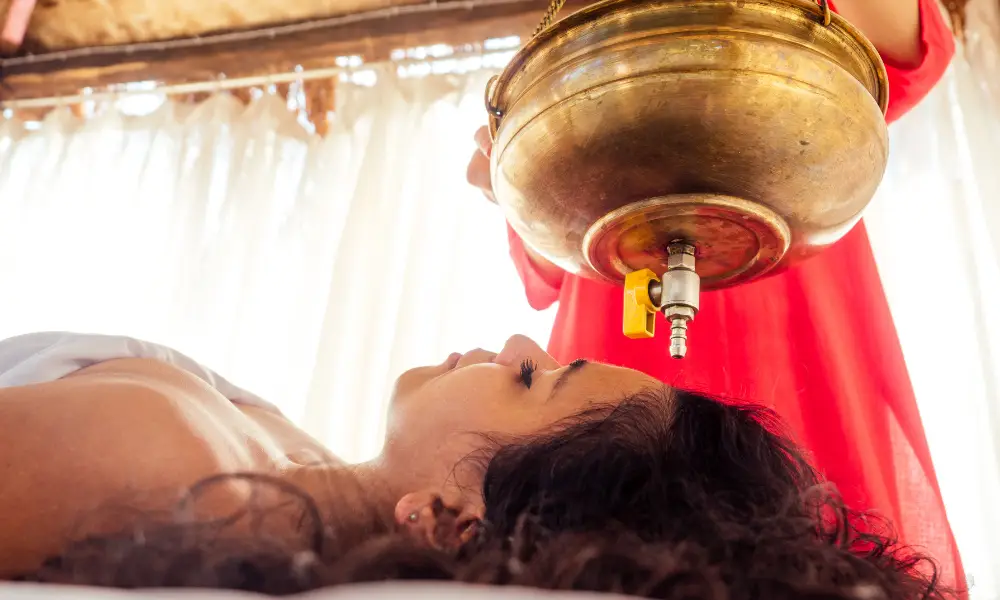PCOS, or Polycystic Ovary Syndrome, affects millions of women worldwide, causing hormonal imbalances and a myriad of health issues. While conventional treatments exist, many individuals are turning to alternative approaches, such as Panchakarma, to address the root causes of PCOS. In this article, we explore the effectiveness of panchakarma treatment for PCOS, its principles, and how it stands out as a holistic healing practice.
Contents
Understanding PCOS
PCOS is a complex hormonal disorder affecting the ovaries, often resulting in irregular periods, ovarian cysts, and fertility issues. The impact of PCOS on women’s physical and emotional well-being cannot be understated. Conventional treatments primarily focus on managing symptoms through medications and lifestyle modifications.
Challenges In Conventional Approaches
While conventional treatments provide relief, they may fall short of addressing the underlying causes of PCOS. The reliance on medications often leads to side effects, and long-term use may not be sustainable for everyone. This gap in treatment options has paved the way for exploring alternative therapies like Panchakarma.
How Panchakarma Targets PCOS 
Panchakarma is a traditional Ayurvedic detoxification and rejuvenation therapy that aims to balance the doshas (Vata, Pitta, and Kapha) in the body. While there is limited scientific evidence specifically addressing the use of Panchakarma for Polycystic Ovary Syndrome (PCOS), some Ayurvedic practitioners may recommend it as part of a holistic approach to managing PCOS symptoms.
Here are some aspects of Panchakarma that may be considered in the context of PCOS:
- Abhyanga (Ayurvedic Massage)
This involves therapeutic oil massage, which is believed to improve blood circulation, reduce stress, and promote hormonal balance. - Swedana (Steam Therapy)
Steam treatments are thought to open up the channels of the body, helping to eliminate toxins and balance the doshas. - Shirodhara
This involves pouring a continuous stream of warm oil onto the forehead, which may help calm the nervous system and reduce stress, which can be a contributing factor in PCOS. - Basti (Enema Therapy)
Basti is a cleansing therapy that may involve the introduction of herbal oils or decoctions into the rectum. It is believed to eliminate toxins and balance the doshas. - Nasya (Nasal Therapy)
This involves the administration of herbal oils or powders through the nasal passages, which is thought to have benefits for hormonal balance.
It’s important to note that while some people may find relief from PCOS symptoms through Ayurvedic practices, scientific evidence supporting the effectiveness of Panchakarma specifically for PCOS is limited. Additionally, individual responses to such therapies vary.
If you are considering Panchakarma or any Ayurvedic approach for PCOS, it’s crucial to consult with a qualified Ayurvedic practitioner or healthcare professional. They can assess your case, provide personalized recommendations, and integrate Ayurvedic practices into a comprehensive treatment plan that may include lifestyle modifications, dietary changes, and, if necessary, conventional medical interventions.
Key Panchakarma Therapies For PCOS
Abhyanga (Ayurvedic Massage)
Abhyanga, or Ayurvedic oil massage, is a therapeutic practice that involves massaging the body with warm herbal oils. While there is limited scientific evidence directly linking Abhyanga to the treatment of Polycystic Ovary Syndrome (PCOS), some Ayurvedic practitioners may recommend it as part of a holistic approach to managing PCOS symptoms.
Here are some potential benefits of Abhyanga that may be relevant to individuals with PCOS:
- Improved Blood Circulation
Abhyanga is believed to enhance blood circulation, which may help address issues related to hormonal imbalances associated with PCOS. - Stress Reduction
PCOS symptoms can be exacerbated by stress, and Abhyanga is thought to have a calming effect on the nervous system. Reducing stress levels may contribute to the overall well-being of individuals with PCOS. - Balancing Doshas
Ayurveda suggests that imbalances in the doshas (Vata, Pitta, Kapha) can contribute to health issues, including PCOS. Abhyanga is thought to help balance the doshas, promoting harmony within the body. - Lymphatic Drainage
The massage strokes used in Abhyanga are designed to stimulate the lymphatic system, potentially aiding in the removal of toxins from the body. - Moisturizing the Skin
PCOS can be associated with skin-related issues, such as dryness. Abhyanga, with its use of nourishing oils, can help moisturize the skin.
Swedana (Steam Therapy)

Swedana, an Ayurvedic therapy involving steam treatment, is used to open up the channels of the body, promote detoxification, and balance the doshas (Vata, Pitta, and Kapha). While there isn’t direct scientific evidence supporting the use of Swedana as a standalone treatment for Polycystic Ovary Syndrome (PCOS), some Ayurvedic practitioners may recommend it as part of a holistic approach to managing PCOS symptoms.
Here are potential ways in which Swedana might be considered in the context of PCOS:
- Detoxification
Swedana is believed to facilitate the elimination of toxins from the body through sweating. This detoxification process may be thought to support overall health, potentially influencing factors related to PCOS. - Improved Circulation
The application of steam during Swedana is intended to increase blood circulation. Improved circulation could play a role in addressing hormonal imbalances associated with PCOS. - Relaxation
Stress management is important in PCOS management, as stress can exacerbate symptoms. Swedana, by promoting relaxation, may contribute to stress reduction and overall well-being. - Balancing Doshas
Ayurveda suggests that balancing the doshas is crucial for maintaining health. Swedana is believed to help balance the doshas, which could be beneficial in addressing the underlying imbalances associated with PCOS.
It’s essential to note that while Swedana may be a part of Ayurvedic recommendations for PCOS, it is usually not considered a standalone therapy. PCOS management often involves a comprehensive approach, including lifestyle modifications, dietary changes, and, if necessary, conventional medical interventions.
Basti (Enema Therapy)
Enema therapy, known as “Basti” in Ayurveda, involves the introduction of herbal oils, decoctions, or other substances into the rectum for therapeutic purposes. While there is limited scientific evidence specifically addressing the use of enema therapy for Polycystic Ovary Syndrome (PCOS), some Ayurvedic practitioners may recommend it as part of a holistic approach to managing PCOS symptoms.
Here are some potential ways in which enema therapy might be considered in the context of PCOS within the framework of Ayurveda:
- Detoxification
Basti is thought to assist in the removal of toxins from the body. In Ayurveda, detoxification is believed to contribute to overall health and may be considered in addressing imbalances associated with PCOS. - Balancing Doshas
Ayurveda suggests that imbalances in the doshas (Vata, Pitta, and Kapha) can contribute to health issues, including PCOS. Enema therapy is believed to help balance the doshas, promoting harmony within the body. - Hormonal Balance
Some Ayurvedic practitioners may recommend specific herbal formulations in enema therapy to support hormonal balance, which is relevant in the context of PCOS.
It’s crucial to note that while enema therapy may be part of Ayurvedic recommendations for PCOS, it is usually not considered a standalone therapy. PCOS management often involves a comprehensive approach, including lifestyle modifications, dietary changes, and, if necessary, conventional medical interventions.
Before considering enema therapy or any other Ayurvedic practices for PCOS, it is advisable to consult with a qualified Ayurvedic practitioner or healthcare professional. They can assess your case, provide personalized recommendations, and ensure that any complementary therapies are safely integrated into your overall treatment strategy. Always communicate with your healthcare team about any complementary treatments you are considering to ensure coordinated care.
Precautions And Considerations 
Trained and qualified practitioners generally consider Panchakarma treatments safe when conducting them. However, individual responses to Panchakarma can vary, and there are potential side effects and considerations, especially for specific conditions such as PCOS (Polycystic Ovary Syndrome). It’s important to consult with a qualified Ayurvedic practitioner or healthcare professional before undergoing Panchakarma or any other alternative therapies. Here are some potential considerations:
- Detoxification Reactions
Panchakarma involves detoxification processes that may temporarily release stored toxins in the body. This could lead to detoxification reactions, including headaches, fatigue, or other mild symptoms. The cleansing process typically considers these reactions as temporary. - Individual Sensitivities
Some individuals may be more sensitive to certain herbs, oils, or procedures used in Panchakarma. It’s important to communicate any allergies or sensitivities to the practitioner before the treatment. - Aggravation of Symptoms
In some cases, there might be a temporary aggravation of symptoms before improvement occurs. In Ayurveda, practitioners refer to this as a “healing crisis” or “healing reaction.” - Dehydration
Certain Panchakarma therapies, such as Swedana (steam therapy), may cause dehydration. It’s important to stay well-hydrated during and after the treatment. - Emotional Release
Panchakarma may also involve emotional and psychological cleansing. Some individuals may experience emotional releases during or after the treatment. - Impact on Menstrual Cycle
For women with PCOS, Panchakarma may potentially influence the menstrual cycle. It’s crucial to discuss this aspect with the practitioner, especially if you are trying to conceive.
It’s essential to undergo Panchakarma or any Ayurvedic treatment under the guidance of a qualified practitioner who can tailor the approach to your individual needs and health status. Additionally, keep your healthcare provider informed about any complementary therapies you are considering, especially if you are undergoing conventional medical treatment for PCOS. This ensures coordinated and safe care.
Conclusion
In conclusion, we see how panchakarma treatment for pcos, a comprehensive approach, offers a promising avenue for those seeking sustainable relief from the challenges posed by this hormonal disorder. By addressing root causes and promoting overall well-being, Panchakarma stands as a beacon of hope for individuals navigating the complexities of PCOS.
If you are facing PCOS related issues, pcos treatment at HerMantra can help. Book your free trial online pcos treatment session now.




